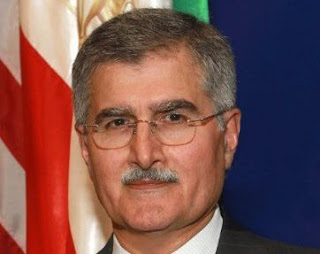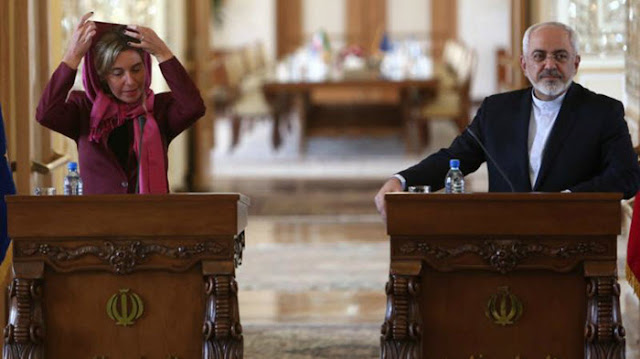 |
| Ali-Safavi |
By
Ali Safavi
Published
December 14, 2015
FoxNews.com
The
heinous terrorist attacks in San Bernardino 12 days ago and in Paris last month
were clear reminders of the growing threat of Islamic extremism. This vicious
ideology continues to take new physical forms - once Al Qaeda, now ISIS. Their
goal is to create an Islamic "state" capable of enforcing Sharia law
by force and unwinding humanity's democratic achievements.
While
the Sunni variant of fundamentalism desperately seeks to achieve this
objective, the Shiite version in Tehran is well on its way. It should be
confronted, not engaged.
Hotspots
like Syria, Iraq, and Yemen have become a breeding ground for ISIS. In all of
them, Tehran's fundamentalist regime - the world's largest state sponsor terror
plays a key role in the mayhem.
The
Iranian regime’s regional agenda is, in the words of its Supreme Leader,
“diametrically opposed” to that of the U.S.
In
fact, after the deadly Paris attacks, Tehran's officials and media quickly
blamed France itself, with some suggesting that the French "deserved"
these attacks because Paris supported ISIS against Syrian dictator Bashar Assad
- a key Iranian ally.
Tehran
is now trying to push a new narrative. For it, ISIS is a blessing in disguise
because it conveniently justifies its destructive involvement in Syria and other
countries. Now, the mullahs are attempting to convince western governments to
join them in backing Assad. That is a dangerous proposition.
Yet
in the aftermath of the nuclear deal, some in the West are optimistic about the
theocracy being more open to political reforms. But the facts and the evidence
do not support this perception. Instead of changing course in the region,
Tehran is even more adamant that others should follow its destructive policies.
And
if improved human rights are a sign of moderation, the situation in Iran has in
fact worsened significantly under the supposedly “moderate” president Hassan
Rouhani.
A
new United Nations report says in the first nine months of this year, more than
690 people were executed in Iran, “likely putting the execution rate during the
first half of 2015 at its highest in some 25 years.” This month, Tehran was
censured for the 62nd time by the United Nations.
The
U.N.’s special rapporteur Ahmed Shaheed made a chilling reminder that juveniles
continue to be executed by the regime, and Amnesty International has called
Iran one of the last remaining executioners of children in the world.
Women
continue to be treated as second-class citizens. Last year, dozens of women had
acid splashed on their faces because they were seen as violating the regime’s
strict veiling laws.
Young
girls are prevented from attending certain university courses like business
management and English translation. And, the parliament (Majlis), under
Rouhani, has passed a series of laws further marginalizing and disenfranchising
half of the population.
Journalists,
bloggers and opposition activists are routinely arrested by the regime. In one
high-profile incident, a young blogger, Sattar Beheshti, was killed under
torture.
According
to the U.N. report, the regime continues to use a variety of torture methods,
including the surgical removal of eyes and hand amputations - much like ISIS
does in its "caliphate."
So
much for moderation!
The
Iranian regime is controlled by the Supreme Leader Ali Khamenei -- an
equivalent of the "caliph" of the "caliphate." He makes all
the final decisions that determine the strategic direction of the
"Islamic" state.
A
few days after the nuclear deal was announced, Khamenei warned, “We will never
stop supporting our friends in the region and the people of Palestine, Yemen,
Syria, Iraq, Bahrain and Lebanon. Even after this deal our policy towards the
arrogant U.S. will not change.”
Iran's
medieval regime cannot be reformed because any sign of moderation would provide
an opening for the emergence of popular demands, which would mature into
protests for democracy.
Many
leading observers agree that the real alternative to fundamentalism lies within
the larger Iranian society, and not within the shrinking confines of a dying
theocracy. Just as the curtain of communism finally fell in Eastern Europe by
that region’s restive population, so can the curtain of fundamentalism in Iran.
Unless
and until the U.S. government looks to solve the Iranian problem by falling
back on the problem itself – the regime in Tehran – it will fail to instigate
genuine change. It should start by challenging Tehran’s involvement in Syria
and working to remove Assad from power as quickly as possible. That is the real
solution to the growing threat of ISIS.
Ultimately,
the answer to Islamic fundamentalism lies in the hands of the Iranian people
and Iran’s organized opposition, which is led by a Muslim woman, Maryam Rajavi.
The removal of the epicenter of fundamentalism in Iran will ensure that the
world is free of the vile threat of extremism for good.
Ali
Safavi is a member of the Foreign Affairs Committee of the National Council of
Resistance of Iran, which seeks the establishment of a democratic, secular and
non-nuclear Iran.


